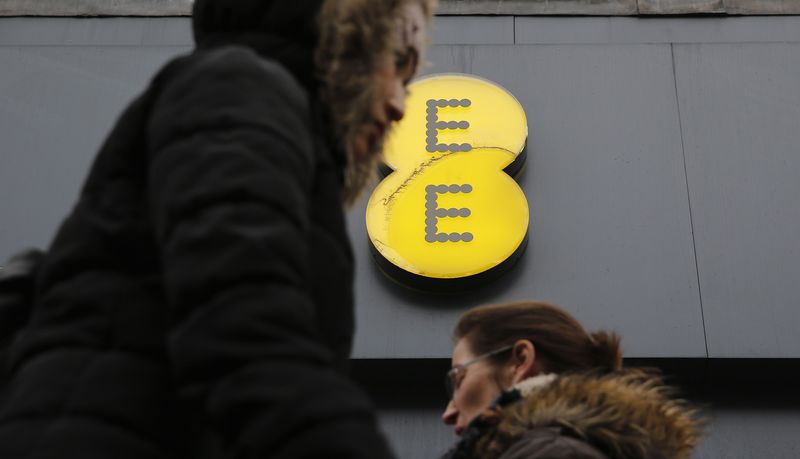By Paul Sandle and Kate Holton
LONDON (Reuters) - BT has finalised a deal to buy mobile operator EE for 12.5 billion pounds ($19 billion) and now faces a contested approval process to seal its status as Britain's dominant communications company.
The deal, bringing together BT's more than 10 million retail customers and EE's 24.5 million direct mobile subscribers, will be funded by a 1 billion pound share issue and 2.4 billion pounds of new debt, and was warmly received by investors who sent its shares to a 14-year high.
But its rivals have already called on regulators to intervene, wary that the fixed-line market leader and main infrastructure provider could abuse its position and reduce competition.
BT had spent the last few weeks in exclusive talks with the owners of EE, Orange and Deutsche Telekom, about a deal. The German and French companies will hold 12 percent and 4 percent stakes in BT, respectively.
"This is a major milestone for BT as it will allow us to accelerate our mobility plans and increase our investment in them," BT Chief Executive Gavin Patterson said on Thursday.
BT had 38 percent of the fixed-line market at the end of 2013, while EE had a third of the mobile market, according to Ofcom and EE.
Patterson said he expected the deal to be scrutinized in Britain, rather than Brussels, and did not expect competition authorities to impose stringent remedies.
Britain would still have four mobile networks, he said, and BT would be no different than European peers like Orange, Deutsche Telekom and Telefonica, with both fixed and mobile networks. "Fundamentally we believe this will pass merger control, and we will be pushing for that very quickly."
But there will be only three players if Hutchison Whampoa completes a 10.25 billion pound deal to buy the 02 business from Telefonica to become the biggest mobile player.
Rivals such as TalkTalk have called on regulators to force BT to spin off its Openreach division, which enables other telecoms companies to access its network.
HEAD START
Vodafone Chief Executive Vittorio Colao, talking as the group reported its third-quarter results, said he would like to see Openreach separated from the wider group.
EE had a head start over rivals in launching 4G services in Britain in late 2012 and it remains the clear leader, with 7.7 million customers at the end of 2014.
Chief Executive Olaf Swantee, who said he would stay on for the regulatory process at least, said the group was on track to have 13.5 million by the end of 2015, and EE was seeing "incredible appetite" for additional services like broadband and TV from customers.
Joint owner Deutsche Telekom will become the largest shareholder in BT and will retain a position in a market where it could have struggled as a mobile-only player.
Shares in BT were trading up 5 percent at 445 pence by 1429 GMT, topping the FTSE 100 index.
Patterson said customers could expect to see some savings by buying a package of services from BT, but stopped short of saying BT would launch a price war in mobile.
"If you look across the continent, prices in general have come down to some extent when fixed and mobile products are sold as a bundle," he said. "So I expect some of the savings we are able to make by simplifying the network will be passed on to the consumer."
Finalising the terms of the deal means BT can turn its focus to the English Premier League soccer rights auction, the biggest battleground in pay-TV which kicks off on Friday and is expected to pit the 169-year-old BT against Sky.
BT said it would achieve combined operating cost and investment synergies of around 360 million pounds per year, four years after the deal completes, and revenue synergies with a net present value or around 1.6 billion pounds.
Analysts at Raymond James said the synergies were higher than they expected, from a company with a good track record of hitting its spending targets.
BT was advised by Goldman Sachs, J.P. Morgan Cazenove and Perella Weinberg, while Morgan Stanley and Bank of America-Merrill Lynch advised Orange and Barclays worked for Deutsche Telekom.
